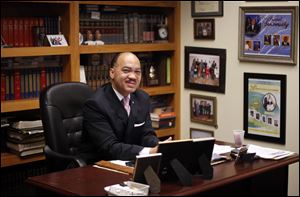
Taking racism out of the pews
Toledo pastor says times have changed for churches
10/26/2013In a 1953 sermon at Atlanta's Ebenezer Baptist Church, the associate pastor, Martin Luther King, Jr., said, “I am [ashamed] and appalled that eleven o'clock on Sunday morning is the most segregated hour in Christian America” because few congregations had racial diversity.
Sixty years later, the Rev. Cedric Brock, pastor at Mt. Nebo Missionary Baptist Church and president of Toledo's Interdenominational Ministerial Alliance, or IMA, said, “It can't be the church. Used to be, but not anymore.
“Times have changed,” Pastor Brock said. “People are more open-minded--especially in our church, in the minority church. I know that racism is real, but to say that the church is the most racist place, you're out of touch if you're saying that today.”

Pastor Cedric Brock in his office at Mt. Nebo Baptist Church. He is the president of the Interdenominational Ministerial Alliance.
With community attention directed to antiracism efforts, particularly the “Changing Minds and Changing Lives: Combating Racism” events by the Toledo Community Coalition and The Blade, and the Rev. Tony Scott's “G-Race” sermon series at the Church on Strayer in Maumee and meetings he is holding to bring black and white ministers together, Pastor Brock expressed the feeling that church-oriented racism is receiving too much focus while antiracism work in the faith community is not being recognized.
Pastor Brock said that the IMA has been quietly doing interracial religious work without calling attention to the fact.
And sometimes the IMA has been more visible about it, like after Hurricane Katrina when Pastor Brock said the IMA worked with the University of Toledo and about 100 pastors to raise more than $30,000 for relief.
With new efforts calling attention to racial reconciliation, Pastor Brock wondered, why didn't The Blade, the Toledo Community Coalition, and the Church on Strayer “come and be a part of that that's already been going on [with the IMA]? People are already sweating and struggling. Why can't they be part of that? Or are they trying to re-create another wheel, or what we're doing isn't good enough?”
There is a common denominator to the different efforts. The Rev. Robert Culp of First Church of God is involved with the coalition and The Blade, with Pastor Scott and the Church on Strayer, and with the IMA.
“I would not neglect the IMA at all,” Pastor Culp said, “because it's performing a service that very much needs to be done. Its job is to keep hope alive.”
But the IMA can't address everything, he said. “In my view, there probably still are not enough things happening to overcome all of the evils that have grown out of racism through the length of its history in our nation. So there are a multitude of approaches that are necessary to be able to begin to make a dent and really to change a culture. I see each of these groups having a part, and none of them are working at odds; they're all helping us move toward a like-minded goal.”
“Toledo's not that bad when it comes to race relations. I've seen a lot worse places,” Pastor Brock said. “I just don't want Toledo or other people of faith to be misrepresented.” He referred to a breakfast Oct. 3 when Pastors Scott and Culp met with 10 white ministers and 10 black ministers; Pastor Brock was one of the African Americans there.
Pastor Scott said about the meeting, “How about us ministers all stepping across the aisle and cultivating a personal relationship with someone of a different ethnicity than we are, and let's see where this will go." Pastor Brock said that Pastor Scott's plan is to expand the group to 100 blacks and 100 whites, and he said the partnering might confuse people new to Toledo.
“If you saw that they're just meeting now with 10 black pastors in 2013,” a person might wonder if race relations are decades behind the times, he said. “I just don't want Toledo or other people of faith to be misrepresented, and with us meeting with 100 white and black pastors, that is very confusing to a city that already has stuff going on” like the IMA's continuing work.
But, Pastor Culp said, “If you can get leadership to be aware of, conscious of, and involved in these matters of reconciliation, it's a dimension that has a major influence as far as churches are concerned.”
Segregation isn't as pronounced as in Martin Luther King's time but, Pastor Culp said, “We presently don't have truly interracial churches. We have churches where the worship style appeals to both blacks and whites or its minister [does], but you don't have a true integration of people.” A half hour after the service ends, he said, it's more like a school cafeteria “where black kids sat together and white kids sat together.”
But “our kids are kids, they're not color,” Pastor Brock said, so racial barriers can be crossed.
The IMA will continue to do the work. “It's Matthew 7:12, 'Do unto others as you would have them do unto you.' It's just the righteous way,” said Pastor Brock.
Contact TK Barger @ tkbarger@theblade.com, 419-724-6278 or on Twitter @TK_Barger.